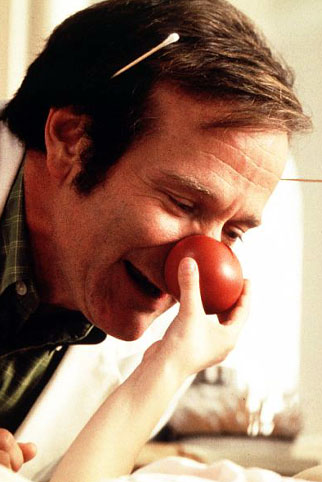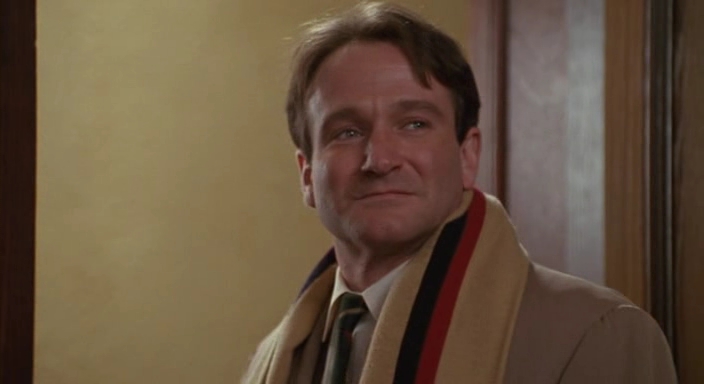“You treat a disease, you win, you lose. You treat a person, I guarantee you, you’ll win, no matter what the outcome. Our job is improving the quality of life, not just delaying death,” so said Robin Williams in Patch Adams (1998).
**
Who else but Williams with a clown’s nose and a philosopher’s wisdom could have pulled off these lines? But first, that scene in the film..both poignant and ironical in retrospect. And what a face-off between Philip Seymour Hoffman (found dead in his apartment this February with a syringe in his arm) and Williams as they spar over what medicine really is. Hoffman is the academician and Williams as Adam is the spiritualist who thinks, “being a prick” is not the only way to accomplish anything of value in life.
**
Both men realise at some point that they are on the same path. The path of healing people. And that is why in the end when Adams is on the verge of giving up on life and idealism, he sees a butterfly and the hope-drenched wings pull him back from the brink. Because he wants to go on healing.
The irony.
**
The clown has morphed into Hamlet now. Perhaps he always was. There are memories..in retrospect of how unwilling Williams was to let the world glimpse the real man behind the happy mask. Watch him Inside The Actor’s Studio where for hours, he impersonated other voices, characters, brought the house down, reducing onlookers to tears but never really let anyone in. Both Seymour and Williams in the end grappled with the terrible dichotomy of being men of great gifts and deep, unquenched darkness. Their gifts could and did heal all those who watched them, but in the end, nothing was enough to pull back either of them from the brink. How utterly tragic that Williams, who played a munificent genie, a teacher bringing dead poets to life and a doctor of souls, gave up on his life.
**
It is hard to forget that face. That profoundly sad and deeply joyous face when a surly voice says, “I said, leave… Mr Keating,” and a baby-faced Ethan Hawk cries, “O’ Captain, my captain” and stands on a desk…as if it was the deck of a brave, battleworn ship, and Williams…a hero who must not go unsung..
Yes, that scene in Dead Poets Society (1989) that will now forever be associated with a man who, even when he smiled, seemed to mourn the loss of something irreplaceable. What his face spoke of more than anything else…was empathy. Deep empathy for all things human, flawed, painful.
**
Watch him hold forth about love, death, loss from a bench in a Boston park in Good Will Hunting (1997) and take layer after layer of defensiveness from Matt Damon with the scathingly insightful and yet kind, “You think I know the first thing about how hard your life has been, how you feel, who you are, because I read Oliver Twist? Does that encapsulate you? Unless you want to talk about you, who you are. Then I’m fascinated. I’m in. But you don’t want to do that, do you, sport? You’re terrified of what you might say. Your move, chief.” Someone should have said some of these lines to him.
**
That manic energy and loud showmanship we saw in Good Morning Vietnam (1988) when he says, “Just play it loud! Okay?,” that ham in Nine Months, the funny, sweet nanny of Mrs Doubtfire, the jovial aside in Bobby McFerrin’s Don’t Worry..Be Happy were all bits and pieces of one big mellow heart beating with unbearable joy and pain. When he locked eyes with the world and said, “It’s not your fault,” we believed him.
**
He was so many people but my favourite memory of him is as himself when he visited Koko, the gorilla who communicated with him in sign language, wanted to be tickled by him and tickled him into a heap of helpless laughter. Maybe that is what he wanted in the end. To laugh a bit. Not at a gag or for the camera but from his gut. Deeply felt joy is simple but sometimes impossible to come by even if you are the greatest comic talent in the world.
Reema Moudgil works for The New Indian Express, Bangalore, is the author of Perfect Eight, the editor of Chicken Soup for the Soul-Indian Women, an artist, a former RJ and a mother. She dreams of a cottage of her own that opens to a garden and where she can write more books, paint, listen to music and just be silent with her cats.








 with
with